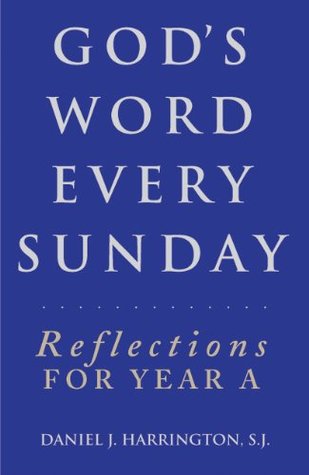Kindle Notes & Highlights
Started reading
March 28, 2020
The name “Jesus” means “the Lord saves.”
The term epiphany means a showing forth or manifestation.
this Jewish child named Jesus has significance for all the peoples of the world.
In the biblical context holiness is primarily an attribute or property of God. God is the Holy One par excellence. Persons and things are holy by virtue of their relationship or contact with God. All holiness is a reflection and extension of God’s holiness.
Their rebellion at Massah and Meribah (these place names mean “testing” and “rebellion,” respectively)
It takes place at the well near Shechem, the Samaritans’ traditional place of worship.
John’s central message is that Jesus is both the revealer and the revelation of God.
Because Jesus is God’s Word to us, whatever can be known and remembered about Jesus is precious precisely because in coming to know Jesus we come to know God.
Our task as believers and as a Church is to keep alive the memory of Jesus. We keep his memory alive through reading and praying the Scriptures, gathering in Jesus’s name and celebrating the Eucharist “in memory” of him, handing on the great tradition of Christian faith, and living according to his wise teachings.
As Paul suggests in 1 Corinthians 10, this term can have two meanings: the body of Christ that we share in the Eucharist, and the body of Christ that we form as the community of believers united with the Risen Christ. The two meanings are related, and one gives depth to the other. Their combination reminds us that the Eucharist is profoundly social
For early Christians the image of Jesus as the Lamb of God expressed their conviction that Jesus died for us and for our sins, and made possible right relationship with God. Theologians call this “justification.”
Their hope was rooted in the past, looked forward to the future, and was based in the present.
As limited humans we can only get glimpses of transcendent and eschatological realities like God’s kingdom.
As a wise teacher Jesus meets people where they are and tells them thought-provoking stories about what was his central theme.
Jesus proclaimed the kingdom of God prodigally in word and deed.
In the parable of the mustard seed the primary point of comparison is the contrast between the smallness of the seed and the greatness of the result (“the largest of plants”).
In the parable of the yeast the primary point of comparison is again the contrast between the small amount of yeast and the large batch of bread that its mysterious action can produce.
As followers of Jesus we look forward in hope to the fullness of God’s kingdom and so we pray, “Thy kingdom come.”
The cross is our distinctive symbol of identity and hope.
At first glance the cross is a very peculiar symbol of identity and hope. In the Greco-Roman world in which Jesus lived and died, the cross was an instrument of great suffering and shame. Under the Romans, crucifixion was regarded as a terrible punishment visited upon rebels and slaves. One ancient writer called it the “cruelest punishment.” It was a public event, meant to deter possible troublemakers from rebelling or acting badly. For people in Jesus’s time and place, crucifixion was a symbol of terror and shame rather than identity and hope.
We must remember always that the passion predictions in the Gospels are also resurrection predictions.
Jesus invites Peter and us into the paradoxical mystery of the cross.
These three vineyard texts insist that God remains in personal relationship with his people, continues to care for and preserve his people, and stays faithful even when the people fail to do so. Thus the vineyard is an image of hope.
In biblical times when ancient Israelites tried to imagine what the fullness of God’s kingdom will be like, one of their favorite images was the banquet.
In a society in which such food and drink were in short supply, these were powerful images.
In the ancient Near East both images—shepherd and host—were often applied to kings. Psalm 23 uses them to describe God as the King of kings and Lord of lords.
We have to accept the invitation to the banquet, and we have to behave in an appropriate manner when we are allowed in.
The point of the first part of the banquet parable is that if you hope to participate in God’s kingdom, you must first accept the invitation.
In Matthew’s context, the king’s harsh treatment of the city (“the king was enraged and sent his troops”) alludes to the destruction of Jerusalem and its temple by the Romans in ad 70. And the rejection of the invitation by the “A list” people (like the scribes and Pharisees) opens up the banquet to include marginal persons (like tax collectors and sinners) and eventually even Gentiles.


